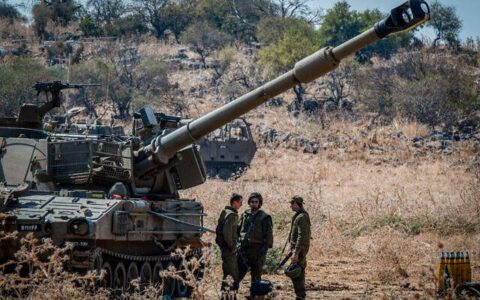
Israel Defense Forces send reinforcements to north amid threat of Hezbollah attack
The Israel Defense Forces on Thursday announced it was sending reinforcements to the northern border amid the threat of retaliation by the Lebanese Hezbollah terror group over the death of one of its fighters in Syria earlier this week.
“In light of a situational assessment that was held in the IDF, it was decided to send a pinpoint reinforcement of infantry troops to the Northern Command,” the military said.
Also on Thursday, sources close to Hezbollah told the London-based Asharq al-Awsat newspaper that the terror group would likely respond to the death of its fighter on Monday night.
An IDF spokesperson said the reinforcement consisted of one battalion — the Golani Brigade’s 13th Battalion — and a small number of additional troops, who were being sent to the Northern Command’s Galilee Division.
The move came two days after Hezbollah accused Israel of killing one of its members — Ali Kamel Mohsen Jawad — in an airstrike south of Damascus on Monday night, raising the possibility of retaliation against the Jewish state.
In response to the terror group’s announcement about Jawad’s death, both the IDF and Hezbollah went on high alert along the frontier, according to media reports from both sides of the border.
In the past, Hezbollah has retaliated for confirmed deaths of its members at Israel’s hands with attacks on the Jewish state, generally along the Israeli-Lebanese border. As a result of this policy, the IDF generally refrains from killing Hezbollah troops in Syria.
Such an exchange occurred last August, when the IDF killed two Hezbollah members that the military said were taking part in an Iranian-run operation in southern Syria that attempted to attack IDF border positions with armed drones.
“If Israel kills any of our members in Syria, we’ll respond from Lebanon and not in the Shebaa Farms, and we tell the Israeli army on the border to be very cautious and to wait for us,” Hezbollah leader Hassan Nasrallah said in a speech at the time.
Days later, in response to their deaths — as well as an alleged Israeli drone attack in Beirut that occurred the same night — Hezbollah fired three anti-tank guided missiles at Israeli military targets along the Lebanese border, narrowly missing an IDF armored ambulance in with five soldiers inside.
On Thursday, sources “familiar with [Hezbollah’s] views” told Asharq Al-Awsat that the terror group was abiding by that same “equation that Nasrallah set last year” of retaliating when one of its fighters is killed in Syria.
The airstrike attributed to Israel on Monday night hit weapons depots and military positions belonging to Syrian regime forces and Iran-backed militia fighters, according to the Syrian Observatory for Human Rights.
The group said the aerial bombardments caused several explosions around the town of Kiswah, an area that has long been associated with Iran’s Islamic Revolutionary Guard Corps.
The attack reportedly came in two waves. The Reuters news service reported that the assault hit targets in the towns of Jabal al Mane, Muqaylabiya and Zakiya, causing “huge blasts” and allegedly killing Iranian personnel.
Reuters quoted a Syrian analyst with sources on the ground named Zaid al Reys as saying that the target of the attack was a “major ammunition depot.”
Israel has launched hundreds of strikes in Syria since the start of the civil war in 2011. It has targeted government troops, allied Iranian forces and fighters from the Lebanese Shiite terror group Hezbollah.
It rarely confirms details of its operations in Syria, but says Iran’s presence in support of President Bashar Assad and Hezbollah is a threat and that it will continue its strikes.
Monday’s attack came a week and a half after Iran and Syria signed an agreement that would see Tehran upgrade the Syrian military’s air defenses, apparently in response to ongoing Israeli strikes in the country.
It was the first strike in Syria to be attributed to Israel since June, when the Observatory said nine fighters were killed in airstrikes targeting positions of Iran-backed militias near the Iraqi border. Those strikes came hours after a similar raid killed six other Tehran-backed fighters.
Source: TOI





